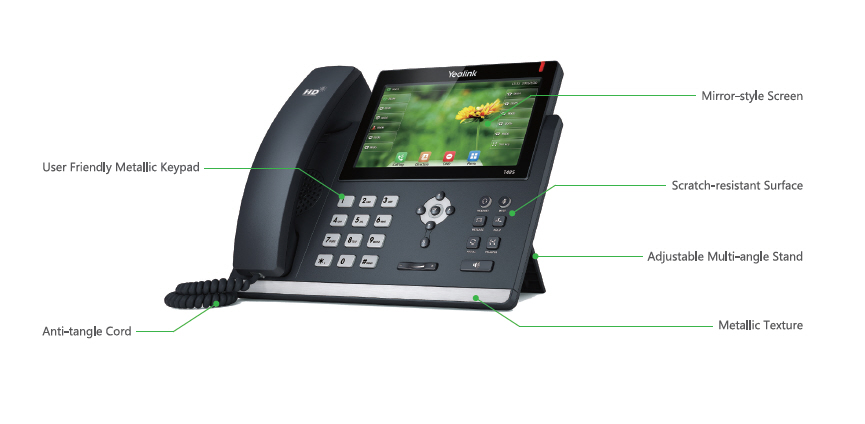Introduction
In the modern business landscape, communication plays a pivotal role in ensuring success. With advancements in technology, Voice over Internet Protocol (VoIP) phone systems have emerged as a game-changer, offering businesses a cost-effective and versatile solution for their communication needs. In this article, we will delve into the Top Features to Look for in a VoIP Phone System, exploring various functionalities that can enhance productivity and streamline operations.
As organizations continue to shift towards remote work and digital communication, understanding the essential features of VoIP phone systems becomes crucial. This comprehensive guide will highlight key attributes that every business should consider when selecting a VoIP provider. From call management options to advanced integrations, we will cover it all.

Understanding VoIP Phone Systems
What is a VoIP Phone System?
A VoIP phone system converts voice into digital signals and transmits them over the internet rather than through traditional telephone lines. This technology allows users to make calls from any internet-enabled device, including computers and smartphones. The flexibility and scalability of VoIP systems make them an attractive option for businesses of all sizes.
How Do VoIP Phone Systems Work?
VoIP technology works by compressing audio data into packets and sending them over an IP network. When you speak into a VoIP phone, your voice is captured, converted into digital data, and transmitted over the internet to the recipient's device. This method significantly reduces costs associated with long-distance calls while improving call quality.
Top Features to Look for in a VoIP Phone System
When considering a new VoIP phone system for your organization, it's essential to evaluate various features that contribute to its effectiveness and efficiency. Below are the top features you should look for:
1. Call Management Features
a. Call Forwarding
Call forwarding allows users to redirect incoming calls to different numbers or devices. This feature ensures that important calls are not missed even when employees are away from their desks.
b. Call Recording
Having the ability to record calls can be beneficial for training purposes or quality assurance. It enables businesses to review interactions with clients and improve customer service.
c. Call Queuing
For companies with high call volumes, call queuing helps manage incoming calls efficiently by putting them in line until an available agent can answer.
2. Scalability Options
One of the significant advantages of VoIP phone systems is their scalability. As your business grows, your communication needs will evolve too:
a. Adding Users Easily
Look for systems that allow you to add users without complicated processes or additional hardware costs.
b. Flexible Plans
Choose providers that offer various pricing plans tailored to different business sizes, allowing you to adjust your service as needed.
3. Integration Capabilities
Seamless integration with existing tools enhances workflow efficiency:
a. CRM Integration
Integrating your VoIP system with Customer Relationship Management (CRM) software can help manage customer interactions better and improve follow-up processes.

b. Collaboration Tools Integration
Some VoIP systems allow integration with collaboration tools like Slack or Microsoft Teams, enhancing team communication regardless of location.

In-Depth Feature Analysis of VoIP Phone Systems
4. High-Quality Audio & Video Calls
Quality matters! Poor audio or video quality can lead to misunderstandings and frustration during conversations:
a. HD Voice Quality
Ensure your chosen provider offers HD voice capabilities for crystal-clear audio during calls.
b. Video Conferencing Features
With remote work on the rise, video conferencing is essential; hence look for features that support group video calls seamlessly.
5. Advanced Security Measures
Security should be a priority when choosing any telecommunication system:
a. Encryption Protocols
Ensure that your provider uses robust encryption protocols such as SRTP (Secure Real-time Transport Protocol) to protect sensitive conversations.
b. Regular Software Updates
Regular updates help patch vulnerabilities; hence choose providers committed to maintaining cybersecurity standards consistently.
Additional Essential Features of VoIP Phone Systems
6. User-Friendly Interface
A straightforward user interface simplifies usage across different skill levels within your organization:
- Choose systems with intuitive dashboards. Ensure easy access to features like voicemail and call history.
7. Mobile Application Support
Today’s workforce often operates remotely; thus mobile applications become indispensable:
- Look for apps compatible with iOS and Android. Check if features replicate those on desktop versions fully.
8. Cost-Effectiveness of VoIP Phone Systems
When evaluating any telecommunication solution, pricing remains paramount:
8.a Transparent Pricing Models
Select providers who offer clear pricing plans without hidden fees—this way; businesses can budget accurately without unexpected costs cropping up later on!
8.b Long-term Savings Potential
VoIP systems often result in lower operating costs compared with traditional systems—especially regarding long-distance calling rates—making this an attractive feature indeed!
FAQs about VoIP Phone Systems
1. What are the primary benefits of using a VoIP phone system?
VoIP phone systems offer cost savings, flexibility in remote work settings, scalability options as businesses grow & enhanced call management features among other advantages!
2: Can I use my existing phones with a new VoIP system?
Yes! Many providers allow you to use existing phones by simply connecting them via adapters or software solutions depending upon compatibility requirements!
3: Is internet speed crucial for optimal performance?
Absolutely! A stable broadband connection is necessary since poor internet quality may lead directly impact call clarity resulting negatively upon user experience overall!
4: Are there any limitations regarding emergency calling services?
Yes! While most providers do support emergency services (like 911), it’s important always verify whether local regulations affect how these services function through specific numbers provided by respective carriers involved here!
5: How does voicemail work within these systems?
Voicemail functionality varies across different platforms but generally involves receiving recorded messages accessible via digital interfaces including email notifications whenever new messages arrive!
6: What happens if there’s an outage?
Most reputable vendors provide backup options ensuring uninterrupted service during outages either through alternative routing arrangements established beforehand accordingly ensuring minimal disruption occurs regardless!
Conclusion
The selection process surrounding any telecommunication tool isn’t trivial; however understanding which elements matter most allows teams greater confidence moving forward confidently knowing they’ve made informed decisions based upon reliable insights gleaned throughout researching potential candidates accordingly! As we've explored throughout today’s discussion concerning “Top Features To Look For In A VOip Phone System,” we acknowledge just how critical it proves identifying these necessities early on fosters smoother transitions later down line yielding fruitful outcomes ultimately benefiting everyone involved along way!
In summary; prioritizing aspects such as call management capabilities alongside robust security measures serves paramount importance while also considering future scalability needs ultimately leading toward sustainable growth pathways reinforcing https://soundcurve.com/ organizational success moving forward steadily into increasingly competitive environments present-day!